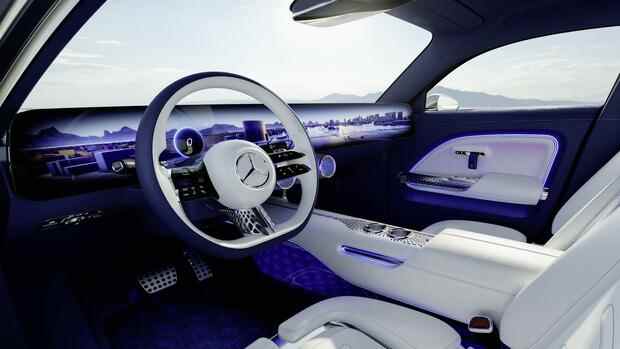Dusseldorf The three German corporations and Tesla are the most innovative automobile manufacturers in the world. This is the result of a current study by the Center of Automotive Management (CAM) in Bergisch Gladbach near Cologne. The US competitors Ford and General Motors found themselves in the middle of the field, Japanese manufacturers such as Toyota were at the bottom of the ranking.
The research institute took a look at the list of innovations from the past three years at the car manufacturers and assigned corresponding index points for them. The three German car manufacturers can shine above all with the large number of innovations in their series vehicles.
One example of this is the “head-up display” with which the vehicle speed and navigation are projected into the driver’s field of vision in the windshield. This technology has now become standard in German cars.
In the CAM ranking, Volkswagen is ahead of BMW and Daimler. In the past three years, the Wolfsburg-based company has been able to score particularly well with its innovations in the field of electromobility.
Top jobs of the day
Find the best jobs now and
be notified by email.
The Wolfsburg-based company wants to become the world market leader in e-cars and overtake the US newcomer Tesla. BMW recently attracted attention with its new driver assistance systems, and Daimler was particularly committed to infotainment and navigation. The “MBUX system” developed for this is considered to be pioneering in the automotive industry.
CAM professor Stefan Bratzel warns German car manufacturers against resting on their successes in terms of innovation. You don’t have to hide in an international comparison. “Now the German manufacturers should make an effort, especially with the software,” emphasizes the university professor. Compared to the years 2016 to 2018, Volkswagen and Daimler in particular have lost some of their innovative strength.
Parking lot of the VW electrical factory in Zwickau, Saxony: The German manufacturers have made a significant leap forward with their current electric cars. The same thing has to happen with the software.
(Photo: dpa)
The VW Group provides a current example of this. In China, the Wolfsburg-based company suffered significant setbacks last year. Ironically, in the People’s Republic, the most important individual market for Wolfsburg, where they are the market leaders with a share of around 20 percent. Instead of the 80,000 to 100,000 originally hoped for, Volkswagen sold just over 70,000 electric cars from the new ID model range in China in 2021.
The real challenger remains Tesla
For Chinese customers, the e-models developed in Germany are neither modern nor digital enough. Volkswagen must increase the software share especially for the Chinese market as quickly as possible in order not to fall further behind in the competition with its most important competitors.
However, the auto analysts at the major Swiss bank UBS do not consider the ID sales figures planned by Volkswagen for 2022 to be particularly ambitious. “VW should bring its market share in electric cars to the level it has been used to in China as quickly as possible,” says UBS analyst Patrick Hummel.
The real challenger for the German automaker remains Tesla. The US company comes fourth on the CAM ranking and has narrowed its gap to the German manufacturers. “Tesla sets the standard in many areas,” emphasizes CAM Director Bratzel. Actually, it is surprising that such a comparatively small company finds itself so far up in the innovation rankings. Tesla manufactured almost a million cars last year, the VW group around nine million.
Tesla is particularly innovative when it comes to software and battery technology. The German automakers have to be careful not to lose touch, Bratzel added. If Tesla had a similar number of subsidiary brands such as Volkswagen and also increased its production figures significantly, the US manufacturer could one day overtake the German car companies in the innovation ranking.
From the point of view of CAM Professor Bratzel, the German manufacturers have to prepare for additional competitors in the growing electrical market.
Xpeng and Nio from China as well as Lucid Motors and Rivian from the USA are all still very young companies and can therefore only show a comparatively small number of innovations. But these newcomers made big leaps and could possibly close the know-how gap to the established manufacturers very quickly.
US manufacturers are waking up
The CAM study attests that the Ford group has made considerable progress among the US automakers. “Ford has caught up a lot in electromobility after the company had just watched the development for a long time,” emphasizes Stefan Bratzel. However, Ford’s new electrical efforts were mainly limited to North America; there was not much to be seen in Europe yet.
General Motors (GM) have made many announcements in terms of electromobility and digitization, but so far only a few of these have been found in real production cars, according to Bratzel. That is why GM is well behind US competitor Ford in the CAM innovation ranking.
Toyota has long spoken out against a comprehensive entry into the production of electric cars. “Toyota is obviously struggling with new developments,” emphasizes Bratzel. The Japanese are therefore still behind General Motors in the innovation ranking. In the past, too, not much has been heard from Toyota when it comes to software development.
In the meantime, however, the world’s largest car company has switched to an electric course. In addition, the software – like Volkswagen – should have its own automotive operating system by 2025. In a few years, Toyota could possibly move up again in the following CAM innovation rankings.
More: Chip shortages and e-car boom: these are the challenges German car manufacturers will have to master in 2022.
